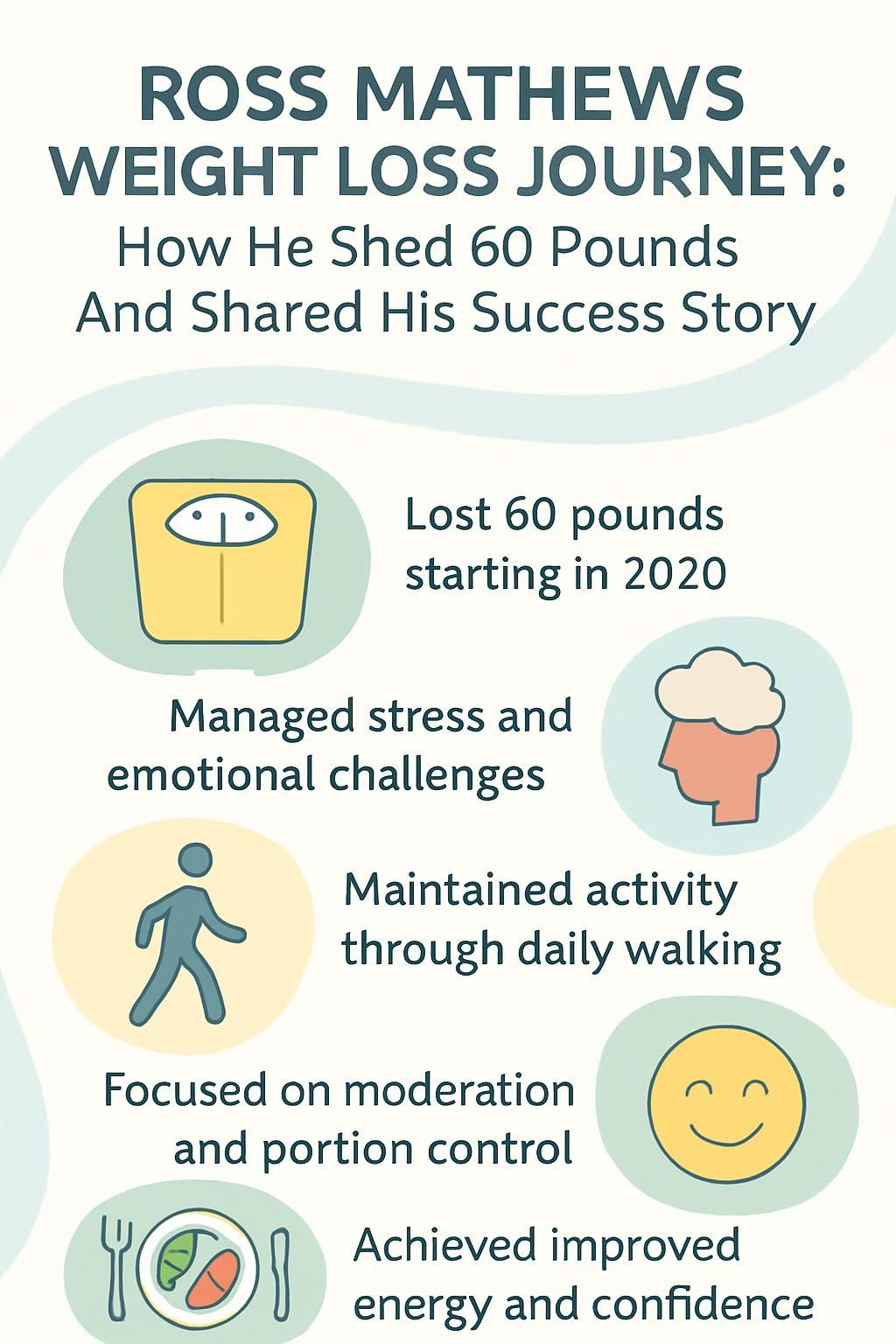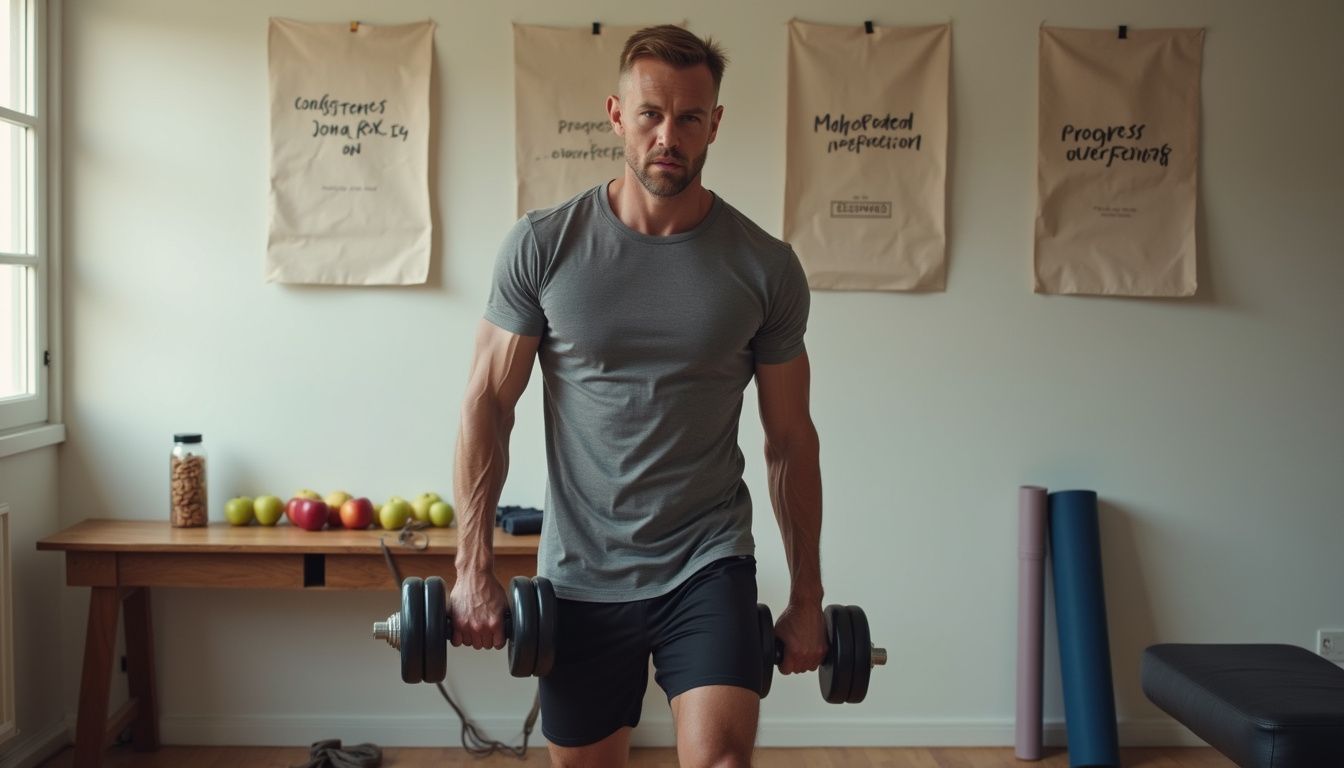Ross Mathews Weight Loss Journey: How He Shed 60 Pounds And Shared His Success Story
Our Nutrition Assistant AI Suite will transform your body. You will lose fat, get toned, and build muscle. Gain confidence and optimal health.
If you have struggled with weight loss and felt unsure where to begin, you are not alone. Ross Mathews’ weight loss journey shows how steady, realistic habits can help you lose 60 pounds and keep going.
In this article, you will see the steps he used to prioritize health, what pushed him to change, and how he maintains results today. Expect practical tips you can try this week.
Key Takeaways
- Ross Mathews lost 60 pounds starting in 2020 with Weight Watchers, high-protein meals, and portion control, not extreme dieting.
- Grief, stress, and public pressure became turning points that moved him toward sustainable change.
- Daily walking in New York City and support from his husband, Dr. Wellinthon Garca, helped him stay active and consistent.
- Mathews follows a “nothing’s off-limits” approach, uses structure from Weight Watchers, and practices self-acceptance to build a healthy relationship with food.
- He reports better energy, confidence, and health markers, and he encourages small goals and flexible methods for long-term success.

Who Is Ross Mathews?

Ross Mathews is a television personality who first gained attention as a correspondent on The Tonight Show with Jay Leno. Many viewers know him from RuPaul’s Drag Race and The Drew Barrymore Show.
What Are Ross Mathews’ Career Highlights?
Fans recognize Mathews for humor, heart, and sharp commentary. He moved from intern to on-air correspondent on The Tonight Show with Jay Leno, where his upbeat style stood out.
He serves as a judge on RuPaul’s Drag Race, offering insight while celebrating drag culture. On The Drew Barrymore Show, he often appears in food segments, sampling creative dishes with Drew, including unusual macaroni and cheese doughnuts.
Mathews also partnered with Yasso for the “I Scream for Yasso” campaign, which highlighted lighter dessert choices. At events like Central Park gatherings, he shared lessons from his health journey and encouraged fans to try simple swaps.
Across talk shows and judging panels, he blends entertainment with wellness. If you follow celebrity health stories, his path offers both motivation and practical ideas.
What Personal Challenges Motivated Ross Mathews?
For years, Ross struggled with yo-yo dieting. He joked that he was a “weight detective” because he tried so many plans. Emotional eating turned food into comfort during grief and stress, which made change harder.
He spoke about those ups and downs at the GLAAD Media Awards in 2023. After losing loved ones, portions grew and eating patterns slipped. Concerns about digestive issues and type 2 diabetes raised the stakes. Pressure from public work, including co-hosting on The Drew Barrymore Show, added stress.
Food often carried guilt, not nourishment. Chasing the lowest number on the scale led to frustration. He shifted his focus away from quick fixes and toward a healthier relationship with food.
Mathews now says you win the journey by showing up for yourself each day. That mindset helped spark change.
The Turning Point in His Weight Loss Journey
Big change can start with a single decision, then build through small actions.
What Inspired Ross to Prioritize His Health?
In 2020, the loss of his mother deeply affected him. He noticed how often he used food for comfort and decided to take a different path. The goal moved from a number on the scale to feeling well and staying consistent.
He began sharing “rossipes,” his lighter takes on favorite meals. Dishes like spaghetti squash with sauce or zucchini lasagna made home cooking enjoyable, not dull. Joining Weight Watchers gave him structure, and high-protein meals boosted fullness while keeping flavor.
He spoke about these changes on The Drew Barrymore Show and on social media. That openness made his journey relatable to anyone who wants balance without strict diet rules.
How Did Personal Life Events Affect His Journey?
Moving to New York City created new routines. Evening walks with his husband, Dr. Wellinthon Garca, increased daily steps and added built-in accountability. These simple habits stacked up over time.
Support from loved ones kept the process doable. Encouragement at home helped him follow through on healthy plans, especially on hard days.
As Ross put it,
“We look after each other and celebrate every milestone, big or small.”
That emotional backing made healthy eating and daily movement feel rewarding, not punishing.
Methods Ross Mathews Used to Shed 60 Pounds
Ross lost 60 pounds with steady, realistic steps. You can adapt the same ideas to fit your life and schedule.
Adopting a Healthier Diet
Stocking the right foods made better choices easier. He kept yogurt, lean proteins, and plenty of vegetables on hand. Simple swaps replaced heavier favorites, which lowered calories without losing taste.
He limited high-calorie meals like large pizza slices. For evening snacks, popcorn, pickles, a small amount of Parmesan, or a few nuts helped curb cravings. He also discovered new favorites, like mushrooms in easy recipes.
- Plan protein at each meal, such as eggs, chicken, fish, or tofu.
- Fill half your plate with non-starchy vegetables for volume and nutrients.
- Keep nutrient-dense snacks ready so last-minute choices stay on track.
Dietitians often recommend these habits because they improve nutrition while supporting long-term results. Small tweaks, done daily, lead to steady progress.
Incorporating Regular Exercise
You do not need a gym to be active. Ross focuses on walking, especially around New York City. Those steps add up, day after day.
After long days on set, he and his husband walk together. The routine provides movement, stress relief, and time to connect. Consistency matters more than perfection.
- Target at least 150 minutes of brisk walking per week for heart health and weight control (CDC, 2022).
- Short 10 to 15 minute walks after meals can aid blood sugar and digestion.
- Try a step target that fits your schedule, then increase it gradually.
Starting with everyday activity, like walking your dog or exploring your neighborhood, can build a strong base. Progress grows from there.
Joining Weight Watchers for Support
Ross joined Weight Watchers for structure and support. The program helped him track food, stay mindful of portions, and learn patterns that worked for him.
Accountability improved consistency. Weekly check-ins and digital tools made his plan easier to follow. Many people find that support from a group or coach strengthens motivation and keeps goals in view.
Key Lifestyle Changes
Sticking to simple rules helped Ross maintain momentum without feeling boxed in.
How Did Ross Use Portion Control?
Portion control made a big difference. He chose snacks with clear serving sizes and modest calories. For example, Yasso Poppables come in 10 to 12 bite-sized pieces per bag, at about 35 calories each. Easy tracking helps prevent overeating.
He did not ban treats. He enjoyed smaller portions, especially in the evening. That approach felt realistic and helped him stay consistent long term.
What Does “Nothing’s Off-Limits” Mean in His Diet?
“Nothing’s off-limits” means you can eat your favorite foods in reasonable amounts. No food is labeled good or bad. This mindset reduces guilt and cuts the urge to binge after strict rules.
Ross limited portions instead of cutting foods out. That balance made the plan flexible, enjoyable, and easier to follow month after month.
Why Did Ross Prioritize High-Protein Meals?
High-protein meals helped him feel full longer, which made portions easier to manage. Protein also supports muscle during weight loss, which helps maintain metabolism.
He kept staples like turkey, eggs, and low-fat dairy. These foods supported steady energy and better mood during stressful days. Many studies show higher protein diets improve satiety and help with weight control (HHS, USDA Dietary Guidelines).
Benefits Ross Experienced Post-Weight Loss
Progress showed up in daily life, not just on the scale.
How Did Ross’ Energy Levels Improve?
After dropping 60 pounds, energy improved. Work days felt more manageable, and evening walks were easier to enjoy. Movement took less effort; recovery took less time.
With more stamina, he handled busy schedules with less fatigue. That extra energy also made it easier to keep up healthy habits.
What Impact Did Weight Loss Have on His Confidence and Mental Health?
Confidence grew with each small win. He began to see himself as strong and capable. That positive feedback helped lower stress and lifted mood.
Focusing on progress instead of perfection supported mental health. Many people find that small, steady milestones build motivation and self-trust over time.
How Did His Physical Health and Well-Being Change?
He noticed healthier numbers and less strain on joints. Steady routines, including a balanced diet and regular walks, helped him maintain results for years.
Experts agree that gradual, sustained weight loss supports better heart health and lowers chronic disease risk. In my own routine, adding daily walks and home-cooked meals improved sleep and energy in just a few weeks.
How Ross Maintains His Weight Loss
Maintenance is a daily practice, not a finish line.
How Does Ross Stay Consistent with Healthy Eating?
He keeps his kitchen stocked with vegetables, lean proteins, and smart snacks. This makes quick, nutritious choices easier on busy days.
He also shares “rossipes” to keep meals fun and flavorful. Planning simple menus for the week saves time and stress. If you add a lighter dessert, like Yasso Poppables, you can satisfy a sweet tooth without losing momentum.
What Role Does Regular Exercise Play in Maintenance?
Walking remains his main workout. Strolls through the city with his husband add movement and connection to everyday life.
Guidelines suggest at least 150 minutes of moderate activity each week to support long-term weight control and lower disease risk (CDC, 2022). Even if you split time into shorter walks, the minutes still count.
How Does Accountability Support His Success?
Accountability keeps habits on track. Ross leans on daily support from his husband, who encourages consistency and celebrates progress.
Structured programs like Weight Watchers add another layer with check-ins and goals. Sharing updates on social media also helps some people stay honest and inspired.
Lessons from Ross Mathews’ Journey
Healthy change lasts when mindset and methods work together.
Why Is Self-Acceptance Important in Weight Loss?
Self-acceptance helps you treat yourself with patience, not punishment. It keeps you focused on behavior and health, not only the scale.
When you set realistic goals and notice small wins, motivation rises. Ross used that approach to maintain consistent effort and protect his well-being.
How Can You Balance Wellness Without Diet Culture?
Allow all foods in moderation. Enjoy favorites in smaller amounts so you do not feel deprived. Mindful eating often works better than strict rules for long-term success.
High-protein meals can improve fullness and energy, but treats still fit in limited portions. Weight Watchers uses guidance, not bans, which supports a healthy relationship with food.
Ross Mathews’ Message to Others
Your path does not need to be perfect to be effective.
How Does Ross Encourage a Positive Relationship with Food?
Food should be enjoyable. Ross avoids labeling foods as bad. He focuses on portions, balance, and taste.
Cooking at home builds confidence and control over ingredients. He uses Weight Watchers for structure while keeping flexibility at mealtimes. That combination helps reduce cravings and supports long-term habits.
What Advice Does He Give to Those Starting Their Journey?
Set small, doable goals. Aim for consistency, then adjust as you learn what works. His motto: “You never win this battle, you win by being in the fight.” Keep going, even after setbacks.
Respect different tools. Some people use medications like Ozempic with their doctor’s guidance. Ross chose another route. Choose what fits your health needs, and speak with a clinician if you are unsure.
Conclusion
Ross Mathews’ weight loss journey shows how practical steps can deliver change. Structure from Weight Watchers, high-protein meals, portion control, and daily walking helped him lose 60 pounds and feel better day to day.
You can use the same ideas to lose weight at a pace you can maintain. Start with small actions, stack them, and lean on support. Healthy change grows from consistency and a kind mindset.
This article is for information only and does not replace medical advice. If you have a health condition, including diabetes or digestive issues, consult a qualified clinician before changing your diet or exercise plan.
- CDC. Physical Activity Guidelines for Adults, moderate activity goal: 150 minutes per week, 2022.
- U.S. Departments of Health and Human Services and Agriculture. Dietary Guidelines for Americans, focus on protein for satiety and muscle maintenance.
- Research on walking shows benefits for heart health, blood sugar, and weight management in adults.
FAQs
1. How did Ross Mathews lose 60 pounds and what methods did he use?
Ross Mathews achieved his 60-pound weight loss through a structured diet, regular exercise, and consistent self-monitoring. He focused on portion control, increased his intake of nutrient-dense foods, and tracked his progress. According to interviews and his public statements, he also sought support from friends and professionals to stay motivated.
2. What specific changes did Ross Mathews make to his eating habits?
Ross Mathews reduced his consumption of processed foods and sugary snacks. He prioritized lean proteins, vegetables, whole grains, and healthy fats. His approach included meal planning and mindful eating to avoid overeating.
3. Did Ross Mathews share any challenges during his weight loss journey?
Ross Mathews openly discussed facing emotional eating triggers and setbacks during his journey. He highlighted the importance of persistence and self-compassion when progress slowed or when he encountered obstacles.
4. What impact did Ross Mathews’ weight loss have on his health and lifestyle?
Ross Mathews reported improved energy levels, better mood, and increased confidence after losing weight. Medical sources confirm that sustained weight loss can lower the risk of chronic diseases such as type 2 diabetes and heart disease (Centers for Disease Control and Prevention).
Summary:
Ross Mathews’ weight loss journey involved dietary changes, exercise, emotional resilience, and ongoing support. His experience shows that structured habits and a supportive environment can lead to lasting health improvements.







